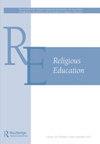在礼仪中共同创造一种记忆、抵抗和关怀的传统:重新思考暴力侵害妇女时代的苦难叙述
IF 0.4
3区 哲学
0 RELIGION
引用次数: 0
摘要
《圣经》告诉热心者,当邪恶和不公正横行时,要向一个信仰团体和这个团体的女儿们传授哀歌。这一有趣的需求引起了信仰团体的注意,即哀叹是如何起作用的,以及它如何成为一种处理痛苦的社区实践。这项研究特别挑战礼仪的充分性和信仰团体对暴力侵害妇女行为的反应。从哀歌的角度阅读耶利米书9章和士师记11章,可以培养一个人想象他人经历的能力,并分享他们的痛苦。本研究重构了作为哀歌的信仰语言,参与了女性遭受暴力的痛苦,并将哀歌传统和礼仪传统中的女性声音纳入其中。通过恢复和教导对苦难有反应的传统,信仰团体可以通过不断地记住、抵抗和关心苦难,为建立共同创造做出贡献,无论是现在还是将来。在悲叹中接受教育不是要颠覆既定的传统,而是要通过接纳被排斥的声音,重新发现声音的丰富性,结合强有力的修改,并带来新的视角来共同构建传统。本文章由计算机程序翻译,如有差异,请以英文原文为准。
Being Educated and Practicing Communal Lament for Co-Creating a Tradition of Memory, Resistance, and Care in Liturgy: Reconsidering the Narrative of Suffering in the Time of Violence against Women
Abstract The Bible tells keeners to teach lament to a faith community and to the daughters of the community when evil and injustice are rampant. This intriguing demand draws the attention of the faith community to how lament works and how it can become a community practice to deal with suffering. This study specifically challenges the adequacy of the liturgy and the response of the faith community to violence against women. Reading Jeremiah 9 and Judges 11 from a lament perspective cultivates one’s ability to imagine the experiences of others and to share in their sufferings. This study reconstructs the language of faith as lament, participates in the suffering of women exposed to violence, and includes the lament tradition and women’s voices in the liturgical tradition. By retrieving and teaching traditions that are responsive to suffering, the faith community can contribute to the building of co-creation by continually remembering, resisting, and caring for suffering, both now and in generations to come. Becoming educated in lament is not about subverting established traditions, but about co-constructing traditions by including excluded voices, rediscovering the richness of voices, incorporating powerful modifications, and bringing new perspectives to the surface.
求助全文
通过发布文献求助,成功后即可免费获取论文全文。
去求助
来源期刊

RELIGIOUS EDUCATION
RELIGION-
CiteScore
0.90
自引率
28.60%
发文量
46
期刊介绍:
Religious Education, the journal of the Religious Education Association: An Association of Professors, Practitioners, and Researchers in Religious Education, offers an interfaith forum for exploring religious identity, formation, and education in faith communities, academic disciplines and institutions, and public life and the global community.
 求助内容:
求助内容: 应助结果提醒方式:
应助结果提醒方式:


